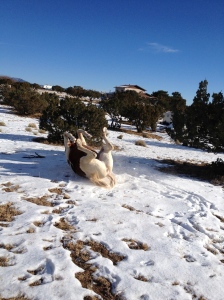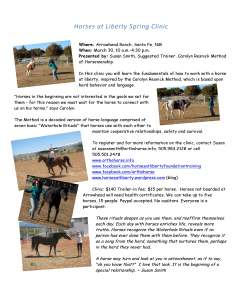Happy New Year!
Between breaking the ice in the water tanks or dealing with tank heaters, regular maintenance such as hoof care and illnesses, there is always something to do for horses in winter. Complicating matters here in the Southwest has been the extreme cold lately. The following is an update of an article I wrote in my newsletter of January/February 2011.
Movement is very important for the horse in winter. Turnout and pasture, walks and riding when you can are all good. Providing more space between water and food sources can keep the horse moving in his living space. Horses may become irritable or badly behaved if they don’t get enough exercise – something to take note of.
Many times I see horses who have developed stiffness over the winter. It can be caused by a variety of reasons. Horses that are blanketed all the time may get soreness across the withers or spine, or even in the chest. I’m exploring whether this might also lead to some skin conditions that seem to emerge during the spring time. Horses don’t move as freely with a blanket on as without. Older horses may not generate enough body heat or manage hair growth well so blanketing might be a good idea for them. Some horses develop arthritis or other joint ailments that make them stiff. If blanketing is a must, then make sure the horse has some time during the warmer hours without the blanket on.
Also, it is best to take shoes off if your horse wears shoes in the winter time. Shoes conduct the cold directly from the ground up the legs, making the horse less able to regulate their body temperature.
Water. I have one mare who grew up wild who thought nothing of raising a hoof to the water tank and breaking the ice. She doesn’t care if the water is cold, just so long as she can get to it. But a lot of horses that have been raised domestically don’t think to do that. Water heaters are great and some warm watery mash might help them take in some more water.
Food. When it’s cold food gets used up in the gut more quickly. Horses stay warm eating, so hours without food in the gut can be very uncomfortable for them. Try to keep hay in front of them, either using a natural feeder or small hole hay bag or a series of them to slow down eating and extend the length of time the horse can eat. They also need more food in winter.
Warm up and Cool down. Make sure you warm up your horse slowly when going out for a ride. Muscles can be stiff and not ready to move quickly right away, especially with the older guys. Also make sure your horse has an opportunity to dry out his woolly coat after you ride. If not, put on a fleece cooler and let that soak up the moisture. It turns so cold once the sun starts to go down, the wet fur against the skin can become icy. This is one place where I think blanketing can be very beneficial.
Curiosity. Horses need activities that engage them. This is not confined to winter, although it can be harder to provide in sub-zero weather. The Waterhole Rituals are a great way to keep you moving around and engaging your horse at the same time, for as long as you can stand to be out there. I’m working on ways to share space without sitting still, because I’m afraid I’ll turn into an ice cube if I am still!
Winter is a great time to get bodywork – for you and your horse. Winter puts specific stresses on our bodies as we try to keep warm and maintain our usual level of activity. Bodywork keeps body systems running smoothly, and supports health and movement. Bodywork is activity in itself and addresses more than muscles, bones and ligaments, but the whole being. If you notice when I work on your horse, he receives, then he wants to move around a bit, nibble some grass, integrate what has just happened. I do a little more, and repeat the process. He relaxes, sinks down into it, sometimes falls asleep, licks, chews, rests. He gets in touch with his body.
To help your horse with body soreness and/or winter conditions, consider signing up for EPR Study Groups will be held in Santa Fe, NM. Look at www.orthohorse.info or www.eprortho.com for calendar announcements for classes.
Private sessions and gift certificates are available by calling 505.501.2478 or emailing susansmith@orthohorse.info
Click on this flyer to find out about my upcoming Liberty Clinic to be held March 30th in Santa Fe.
(copyright) Susan Smith, OrthoHorse, Horses at Liberty





Patches is making snow angels!!
He is! It’s his favorite thing to do when he gets out to the pasture 🙂